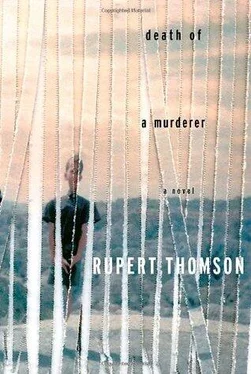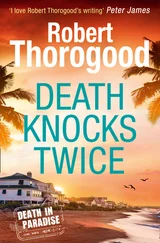Billy zipped up his anorak, then walked out on to the road that ran past the front of the hospital. There were fewer reporters now, and they ignored him. They knew he wasn’t authorised to speak to them — and besides, he didn’t have anything to say. Since Friday afternoon the body of Britain’s most notorious woman had been lying under police guard in the West Suffolk hospital. That was all the news there was. In the morning Phil would brief the press on the details and timing of the funeral. He would inform them that he had arranged for the hearse to slow down on one particular bend in the hospital grounds so they could get the photographs they needed. In return for this concession, he hoped they would agree not to disrupt or in any way interfere with the progress of the cortège.
Passing Rheumatology, Billy followed the road down to the picnic area where he and Sue had had their conversation earlier. It was colder now, and the treetops stirred in the wind. He sat on the same bench, facing out into the dark. He had dozed off, perhaps only for a minute, but he had seen the two lovers. The two murderers. He had gate-crashed a Christmas party that was being held by the chemical firm that had employed them, the party at which they were supposed to have met properly for the first time, and the Beatles song that had been playing in his dream had stayed with him — its bright voices and its crisp, slightly gawky guitar:
When your bird is broken
Will it—
At that point, the needle had skidded across the record, and the music had cut out. In his dream he had imagined that someone had collided with the turntable. A moment of clumsiness or tipsiness. Now, though, half an hour later, he saw it differently. He thought it more likely that part of him had needed to stop the couple before they could go any further. He’d brought the whole thing to an end while they were still free of guilt. It was as if he couldn’t bear to see any more.
He leaned back, the edge of the picnic table pressing against his spine.
“It wasn’t like that,” came a voice.
He turned slowly. At first, there was only the table’s splintered surface, and the slender trunks of silver birches, and an unlit building just beyond…But then he saw a figure standing twenty feet away, half-hidden by the trees, a red dot glowing at about head height. Glowing, then fading. Glowing again.
“It wasn’t that dramatic.”
Oddly enough, he didn’t feel frightened, or even surprised. At some level, perhaps, he had been prepared for something like this — or else he was still in the dream’s soft grip, and normal reactions had no purchase. He looked back towards the hospital. Lights shone in the windows; a group of reporters huddled by the entrance to A and E. He thought about calling the control room on his radio. What would he have said, though?
“Do you like my suit?” came the voice again. “I got it from a catalogue.”
A Manchester accent — even after all these years…
He turned round again. She had left the shadows, and was standing on the pavement, under a streetlamp. The suit was a lilac colour, and her blouse was white with a scalloped collar. Her hair was a dull dyed brown.
“You must be cold,” he said.
She seemed to look at him steadily, then she began to laugh.
Rising to his feet, he moved off in the opposite direction, up the slope. The bones in his legs felt spongy. There was the smell of pine needles and damp bark. He took a deep breath. As he let it out, he heard her speak again.
“Everyone was dancing, not just us.”
When he reached the path that would take him down the west side of the hospital, he hesitated, then glanced over his shoulder. There was nobody under the streetlamp, or in among the trees.
There never had been.
There couldn’t have been.
The wind eased. In the silence a firework burst softly, gold sparks dropping through the darkness to his right. But November the 5th was more than a fortnight ago…Strange how people cling to things. That woman under the street lamp. The murderer. A trick of the mind, of course — he had been talking to himself — and yet there had been a kind of authenticity about the experience. An attention to detail. The lilac suit, the dull brown hair. She’d even had a cigarette with her. He could hear her speaking, the voice flat, curiously deep and coarsened by years of heavy smoking.
It wasn’t like that.
Well, of course not. How could he possibly have known what it was like? And anyway, it had been a dream. He was exhausted, under pressure. He was not himself. If only Sue had let him have his nap…Instead, they had argued. Again. And nothing had been resolved.
He circled round behind the hospital. Parked cars, draughty doorways. To his left was the administration block where Eileen Evans had an office. Most of the windows were showing lights. Nobody was sleeping tonight — or not for too long, anyway.
Everyone was dancing, not just us.
In a brick bicycle shed opposite the Day Surgery Unit, he found some shelter from the wind, and taking out his mobile, he pressed “Contacts” and then “Neil.” When Neil answered, Billy could hear people shouting in the background. Gunshots too.
“Hold on,” Neil said, “I’ll turn it down.”
From the slur in his voice, it sounded as if Neil was drinking again. When he was thrown out of the force, he had lost everything, even his pension. “I gave them half my life,” he had said when Billy visited. “All those fucking years, and for what?” The last Billy heard, Neil was on the books of a firm that supplied security guards.
“Not working tonight?” Billy said.
“No. You?”
Billy told Neil where he was.
“Christ!” Neil said. Billy imagined him sitting up a little straighter on his lumpy sofa. “What’s it like? What’s happening?”
“Actually,” Billy said, “it’s pretty quiet.”
He could sense Neil’s disappointment. Neil was one of those bobbies who like there to be something always going on. He would have wanted scuffles and clashes at the very least, if not a full-scale riot. He would have wanted batons, long shields. Water cannon. Stepping out of the bike shed, Billy turned into the wind. It roared across the mobile’s mouthpiece, which gave him an excuse not to speak for a moment. He had rung Neil, his best friend, because he needed to talk to somebody about what he had seen, but now he had the chance he didn’t think he could do it. He didn’t know how to describe what had happened without sounding a bit unhinged. He wasn’t even sure he could describe it at all. It occurred to him that he might be able to tell his brother — Charlie was a good listener — but it was mid-afternoon in San Francisco, and Charlie would be at work. Besides, he didn’t have enough credit on his phone for an international call.
“Are you outside?” Neil said.
“I’m on my break,” Billy said, shielding the phone again. “How’s Linda?”
“She left me,” Neil said. “She didn’t like me being a security guard. ‘What’s the matter?’ I said. ‘Don’t you feel safe?’ She didn’t think that was very funny.”
They talked for another five minutes, then Billy said he should be getting back.
“Hang on in there, Billy,” Neil said. “Don’t blow it.” And then, with some of his old sharpness, “What were you calling about, anyway?”
“Nothing, really,” Billy said. “I just wanted to say hello. It’s been a while.”
“Maybe I’ll come down and see you sometime.”
“That’d be good.”
“I’ll do it,” Neil said. “I’ll come and see you.”
Читать дальше












